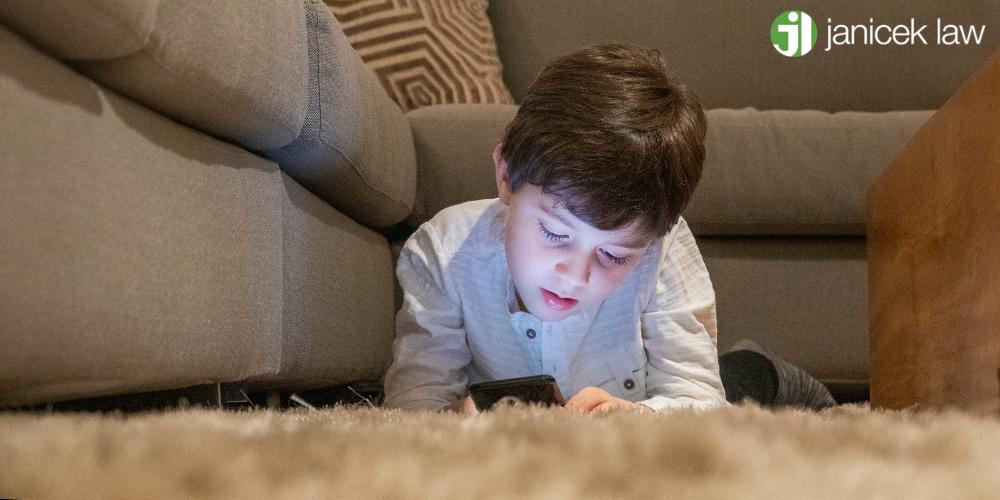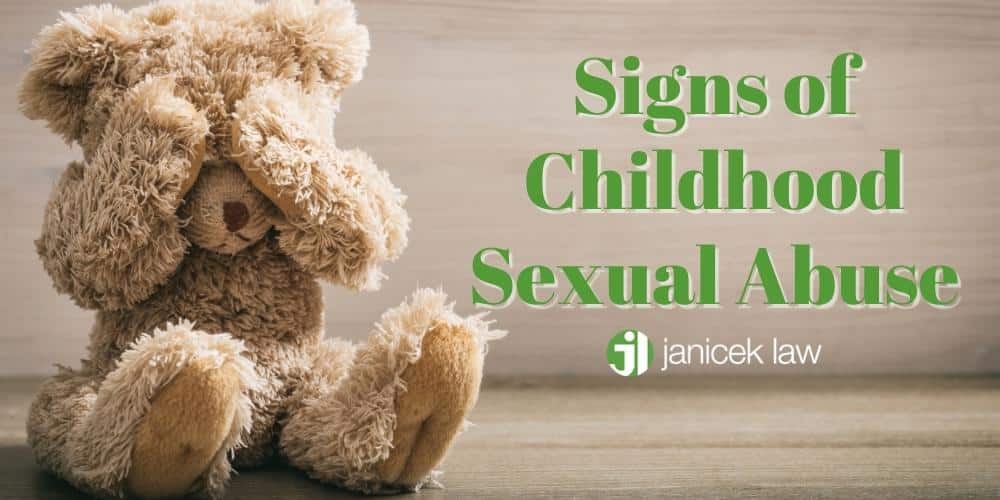Changes in your child’s behavior aren’t always a sign that something is amiss. Sometimes behavioral or physical changes can be a sign of normal growth. Sometimes they may be having trouble at school, with friends, or with other stressful events. These behavioral changes can also be a major warning sign of something more sinister. Physical or emotional changes in your child could indicate that someone is sexually abusing them. Watching for the common signs of childhood sexual abuse can mean that you can put an end to the abuse and get your child the help they need.
At Janicek Law, our compassionate team can help you hold an abuser accountable for their heinous actions. Victims often have a long recovery period due to how sexual abuse affects the brain, so many victims experience issues well into adulthood. Waiting for solid ‘proof’ of sexual abuse can often cause even more harm to the child. Read on below to find out more about the common signs of sexual abuse and how the sexual abuse attorneys at Janicek Law can help. For more information about our legal services and how we can help, call us today at 210-366-4949.
Types of Sexual Abuse
Contrary to popular belief, it’s not only strangers in the night who sexually abuse children. In fact, 93% of child sexual abuse victims knew their abuser. These abusers are often friends, acquaintances, mentors, and even family members of the victim. Sexual abuse is an umbrella term that involves more than sexual touching or penetration. Children under 17 years old cannot consent to any form of sexual contact, physical or otherwise.
The two most common forms of sexual abuse are contact and non-contact abuse. Contact abuse typically involves some form of sexual touching. This can happen when the victim is clothed or unclothed. This can include oral sex, touching, and kissing. Contact abuse also includes forcing a child to participate in sexual activities, making them undress, forcing them to touch themselves or someone else, or using a body part or another object for penetration.
Non-contact abuse can happen in person or online. Non-contact abuse often includes exposing a child to sexual acts, pornography, sexual conversations, or the abuser exposing themselves to the child. It’s common for children to communicate with their peers and friends online–unfortunately, this is also a way for abusers to communicate with your child and begin to groom them.
Another form of abuse is covert incest sexual abuse, where a parent or caregiver uses a child to fulfill emotional or relational needs that should be met by another adult. While it may not involve physical contact, covert incest is deeply damaging and often includes emotional manipulation, boundary violations, and inappropriate dependence. This form of abuse often goes unnoticed because it lacks overt sexual behavior, but the psychological effects on the child can be long-lasting.

What Are the Stages of Grooming?
A common way for abusers to gain access to their victims is through grooming. Grooming allows abusers to take advantage of a child’s naivety and blur the line between normal and abnormal relationships. While grooming can take many different forms, it usually follows a pattern.
- Targeting. Abusers often begin the grooming process by identifying a child to target. The abuser may identify a young person with trouble at home, distant parents, or some other circumstance that may make the grooming easier.
- Access. Abusers can gain access to children in the community or online. They may create fake profiles and pretend to be the same age as their victim or take interest in the same things. In person, the abuser may be part of an organization that allows unrestricted access to children, like teachers, coaches, or tutors.
- Trust. An abuser will jump through hoops in order to gain their victims’ trust. They’ll work to fill a spot that’s missing in the child’s life, like an absent parent or a confidant. In addition to gaining their victim’s trust, an abuser will also try to gain the trust of the victim’s parents and family members. They may do this by offering to help the parents with childcare or by buying expensive gifts for the family.
- Desensitization. After the abuser has gained the victim’s trust, they’ll begin the process of desensitizing them to sexual content. In person, this may be done through physical touch like hugging, wrestling, or pats on the head/back. This desensitization is also for the parents and caregivers as well. As the child grows accustomed to the touch, it will eventually progress to longer, less innocent touches. Online, the abuser may begin exposing the child to sexual content through pornographic pictures, videos, and sexual conversations.
- Control. Abusers will do everything in their power to maintain control over the relationship. They may threaten to harm the child or their family if the child tells someone or tries to end the relationship. They may use pictures and videos they have of the child to extort them as well.
All parents want to protect their children from as much danger as possible, but abusers can manipulate the family of the victim into thinking everything is fine. If you notice any signs of sexual abuse, talk to your child and let them know they can come to you with any issues they may have.
What are the Physical Signs of Sexual Abuse in Children?
Physical signs of sexual abuse are not as common as emotional signs of abuse. Physical signs like bruises and cuts can often come from innocent play with other children, but some signs have no other explanation. In younger children, a sexually transmitted infection is an immediate and major warning sign for sexual abuse. Physical signs of abuse include:
- Sexually transmitted diseases
- Urinary tract infections
- Bruises
- Bleeding from the genitals
- Pain during urination or bowel movements
- Wetting the bed after successful toilet training
- Soiling accidents unrelated to potty training
- Gastrointestinal issues and/or poor gut health
What Are the Emotional Signs of a Sexually Abused Child?
Emotional and behavioral changes are the most common signs of sexual abuse in children. It’s important to remember that these warning signs don’t always point to sexual abuse. Children go through regular emotional and behavioral changes as they grow. Keeping an eye out for these signs can help you get your child the help they need, but some children show no outward signs of abuse. Common emotional signs of sexual abuse includes:
- Sudden or unusual fear of particular places or certain people
- New words for private body parts
- Sudden mood swings
- Behaving “too well”
- Changes in sleep patterns (sleeping too much or not enough)
- Changes in eating habits
- Withdrawal or depression
- Lack of interest in usual activities
- Self-mutilation
- Regression to childhood behaviors like thumb-sucking
Signs of Sexual Abuse in a Toddler
Signs of sexual abuse in a toddler may include:
- Toddlers may start being afraid of certain people or going to specific places
- Sexually abused toddlers often have some form of regression (bedwetting, thumb-sucking, baby talk)
- Any unexplained bruising, bleeding, or redness around their genitals or anus is an absolute red flag for toddler sexual assault.
- Toddlers should not have any knowledge whatsoever of sexual behavior; if they do, this is a warning sign.
- Genital pain when sitting, walking, or using the bathroom
- Sexually abused toddlers will often suffer from nightmares, sleep disturbances, or extreme separation anxiety
- If you notice sexualized play or language that is not appropriate for a toddler whatsoever, consult a therapist, as this is another red flag.
- Your toddler may resist having his or her diaper changed or taking a bath (common in foster care situations)
Any combination of these signs should prompt immediate medical evaluation and contact with child protective services or law enforcement.
Signs of Sexual Abuse in Teenager
Signs of sexual abuse in a teenager may include:
- Sexually assaulted teens will often suddenly withdraw from friends or family
- Depression, anxiety, or mood swings
- While less noticeable, parents should watch for signs of self-harm (cutting, burning) or substance abuse
- Teens who have been abused may avoid school or have a drop in performance
- One of the most obvious signs in teens is major changes in hygiene, eating, or sleeping habits for no apparent reason.
- Unexplained bruises or injuries, especially around genitals or thighs
- Fear of being alone with certain individuals
- Sexually transmitted infections
- Knowledge or behavior that is unusually sexual for age
- Running away or frequent absences from home
- Strong emotional reactions to touch or physical closeness
When a teenager becomes pregnant, parents may not immediately realize the pregnancy resulted from rape, especially if the teen is scared, confused, or protecting the perpetrator. We’re parents, so we say this as compassionately as possible. It is absolutely critical to remain calm, ask open-ended questions, and seek medical care immediately. A medical exam can assess the teen’s health and preserve evidence if needed. Parents should report suspected abuse to authorities and consult an experienced attorney to understand their legal options and protect their child’s rights.

Long-Term Effects of Sexual Abuse
No matter what type of sexual abuse your child suffered, the effects can last for a lifetime. Sexual abuse isn’t always immediately recognizable. Sometimes signs of sexual abuse can appear long after the abuse is over, but that doesn’t mean the abuser can get away scot-free. Sexual abuse can have a lifelong impact on the victim. Even if the child doesn’t remember the abuse or actively blocks it out, the body keeps the score. Trauma has a documented effect on brain function, memory, relationships, and even feeling comfortable in your own skin. Victims of childhood sexual abuse often experience:
- Trouble forming healthy relationships
- Low self-esteem
- Depression and/or anxiety
- Post Traumatic Stress Disorder (PTSD)
- Suicidal thoughts and actions
- Mental health issues
- Substance abuse issues
Signs of a Sexual Predator in the Family
Signs of a sexual predator in the family may include inappropriate physical contact, excessive interest in a child’s activities or body, or regularly isolating the child from others. They may violate boundaries by walking in on the child while changing, insisting on secrecy, or giving gifts to build trust. Other red flags include jealousy when others spend time with the child, insisting on being alone with them, or grooming behaviors such as desensitizing the child to touch. Sudden personality changes in the child, fear of a specific relative, or reluctance to be alone with them may also indicate abuse.
Compensation for Child Sexual Abuse
Money may not change what happened to you or your family, but financial compensation can help your family afford the resources you need to heal. Child sexual abuse often has lifelong ramifications for both victims and the family of the victim. Compensation can make the abuser pay for the damage they caused. A sexual abuse lawsuit can also hold institutions accountable for letting the abuse happen. At Janicek Law, our sexual abuse attorneys can help victims and their families pursue compensation for:
- Medical bills, including therapy costs
- Pain and suffering
- Emotional distress
- Lost income potential
- Loss of consortium
Texas Statute of Limitations for Child Sexual Abuse
Sexual assault has long-term effects on both the mind and the body, and many victims often don’t speak out immediately. Children often don’t understand what’s happening to them. Many victims refuse to speak out for fear that they won’t be believed or that their abuser will retaliate. Victims of childhood sexual abuse often need years to recover from the long-term effects of their abuse. The statute of limitations for sexual abuse has recently been extended to accommodate the healing process.
For civil claims, victims of childhood sexual abuse have 30 years to pursue civil action against both their abuser and any institutions that allowed the abuse to happen. Before the passing of HB 3809, victims only had 15 years from the day of their 18th birthday to pursue compensation.
At Janicek Law, our attorneys can go over the details of your case and determine if you have time to file a civil claim against the abuser.
How our Bexar County Sexual Abuse Attorneys Can Help
Looking for signs of sexual abuse in your children can be a heartbreaking experience. Being able to recognize signs of sexual abuse may not change what happened, but it can help you get help for your family members sooner. If you or a loved one experienced sexual abuse as a child, there are legal options available to you. A sexual abuse civil claim can help hold the abuser accountable for their actions and prevent them from hurting others. At Janicek Law, our compassionate team can help you recover the compensation you and your loved ones deserve after this heinous situation. For a free case evaluation, call us today at 210-366-4949.

